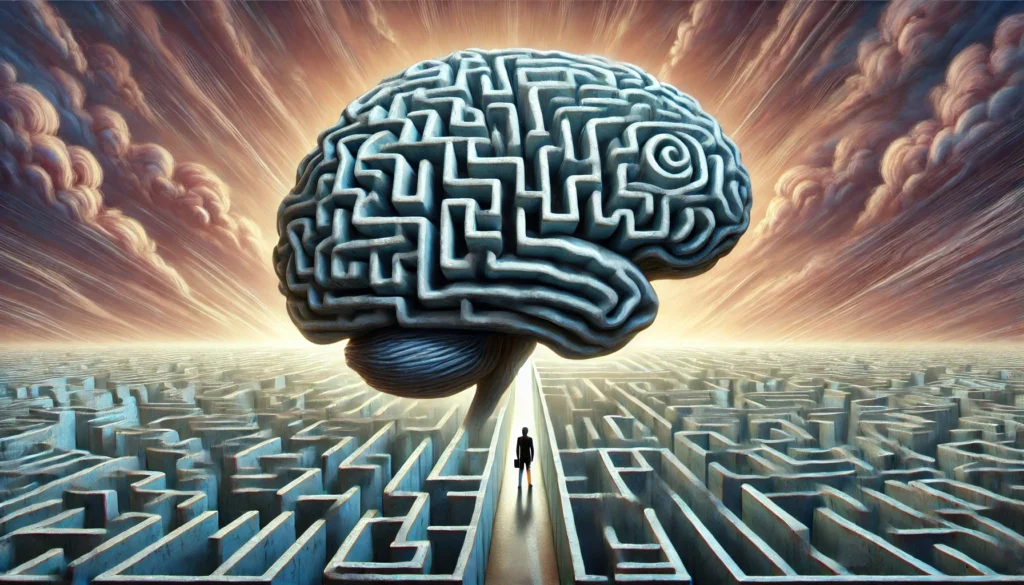Understanding and identifying memory processing disorder symptoms can be a daunting task. Memory processing disorders, which encompass a range of cognitive impairments, primarily affect how individuals perceive, process, store, and retrieve information. This article delves into the nuances of memory processing disorders, particularly focusing on working memory deficits in adults, their symptoms, and the broader implications of these disorders.
You may also like: Understanding the Science Behind Lost Memory
What is Memory Processing Disorder?
Memory processing disorders refer to a spectrum of conditions that affect the brain’s ability to handle information. These disorders can manifest as difficulties in encoding, storing, or retrieving information. While often associated with developmental issues in children, memory processing disorders can persist into adulthood or even emerge later in life.
Understanding the Spectrum of Memory Disorders
Memory processing disorders are not a one-size-fits-all condition. They exist on a spectrum, ranging from mild to severe, affecting individuals differently. Some may experience occasional forgetfulness, while others face significant challenges in daily functioning. These differences underscore the importance of personalized diagnosis and treatment.
Encoding, Storage, and Retrieval Challenges
At the core of memory processing disorders are difficulties with encoding, storage, and retrieval. Encoding is how we initially perceive and process information. Storage refers to how this information is maintained over time, and retrieval is the ability to access stored information when needed. Disruptions at any of these stages can lead to noticeable cognitive impairments.
Lifelong Implications and Onset
While many associate memory disorders with childhood developmental issues, they can persist or even manifest later in life. Adults may encounter these disorders due to various factors, including neurological changes, trauma, or genetic predispositions. Recognizing that these conditions can evolve over a lifetime is crucial for effective management and support.
The Role of Working Memory
Working memory is a critical component of our cognitive systems. It acts as a mental workspace where we manipulate information for tasks such as problem-solving, planning, and comprehension. Unlike long-term memory, working memory is transient and limited in capacity. A deficit in this area can lead to significant challenges in daily functioning.
The Mechanics of Working Memory
Working memory involves a complex interplay of cognitive functions. It allows us to hold and manipulate information temporarily, enabling us to perform tasks that require quick thinking and decision-making. This mental workspace is essential for activities ranging from simple calculations to complex problem-solving.
Distinctions Between Working and Long-Term Memory
It’s important to distinguish between working memory and long-term memory. While long-term memory stores information over extended periods, working memory handles information temporarily. This distinction helps explain why someone might remember events from years ago yet struggle to recall a phone number they just heard.
Limitations and Capacity of Working Memory
Working memory is inherently limited in capacity. Most individuals can hold only a few pieces of information at a time. This limitation can become pronounced in those with working memory deficits, leading to difficulties in completing tasks that require juggling multiple pieces of information simultaneously.
Symptoms of Working Memory Deficit in Adults
Identifying symptoms of a working memory deficit can be challenging due to their subtlety and overlap with other cognitive issues. However, several key indicators can help in recognizing these deficits.
Poor Concentration and Focus
Individuals with low working memory often struggle to maintain attention on tasks, especially those requiring sustained mental effort. This can manifest as frequent distractions, inability to follow conversations, or difficulty completing tasks.
Frequent distractions are common among those with working memory deficits. These individuals might find their minds wandering during conversations or when working on complex projects. Such distractions can interrupt the flow of thought, leading to incomplete tasks and conversations that are difficult to follow.
Inability to follow conversations is another hallmark of working memory issues. People with these deficits may lose track of discussions, missing key points or needing repeated explanations. This can be frustrating in both professional and personal settings, affecting communication and understanding.
Difficulty completing tasks is a direct consequence of poor concentration. When working memory is compromised, even simple tasks can seem overwhelming. Individuals may start projects only to abandon them halfway, unable to keep track of the steps needed to reach completion.
Difficulty in Following Instructions
A common symptom of working memory deficits is the inability to follow multi-step instructions. This challenge arises from the difficulty in holding and manipulating information long enough to execute tasks sequentially.
Holding multiple steps in mind is a significant challenge for those with working memory deficits. When given multi-step instructions, these individuals may remember the first and last steps but forget the details in between. This can lead to incomplete or incorrect execution of tasks.
Sequential task execution is often disrupted in individuals with working memory issues. They may struggle to follow a logical order, jumping from one step to another without completing the necessary intermediate actions. This can result in errors and inefficiencies in task completion.
Remembering instructions over time is another difficulty faced by those with working memory deficits. Even if they initially understand the instructions, recalling them after a short delay can be problematic. This can necessitate repeated explanations or written reminders to aid memory.

Forgetfulness
Forgetfulness is a hallmark of memory processing disorders. This goes beyond occasionally misplacing keys; individuals may frequently forget appointments, lose track of time, or struggle to recall recent conversations.
Frequent forgetfulness is more than just a minor inconvenience; it can significantly disrupt daily life. Individuals may miss important appointments or fail to complete essential tasks, leading to frustration and stress.
Losing track of time is a common symptom of working memory deficits. People may find themselves unaware of how much time has passed, leading to missed deadlines or prolonged activities without realizing it.
Struggling to recall recent conversations can impact personal and professional relationships. Individuals may find it difficult to remember details from discussions, leading to misunderstandings and the need for repeated explanations.
Challenges in Learning New Information
Learning new skills or information can be particularly taxing for those with working memory issues. This difficulty stems from the challenge in processing and integrating new data with existing knowledge.
Processing new information is inherently difficult for those with working memory deficits. They may struggle to focus on new material, finding it challenging to absorb and retain the details necessary for understanding and application.
Integrating new data with existing knowledge is another hurdle. Individuals may find it hard to connect new information to what they already know, leading to gaps in understanding and application.
Retaining new skills over time is often problematic for those with working memory issues. Even after initial learning, they may struggle to recall or apply new skills, necessitating repeated practice and reinforcement.
Impacts on Daily Life and Relationships
The symptoms of working memory deficits extend beyond cognitive challenges and can significantly impact daily life and relationships. Individuals may experience frustration, reduced productivity, and strained interactions due to their cognitive limitations.
Frustration often accompanies working memory deficits. Individuals may feel overwhelmed by simple tasks, leading to feelings of inadequacy and stress. This frustration can spill over into personal and professional relationships, affecting interactions and communication.
Reduced productivity is a common consequence of working memory issues. Individuals may struggle to complete tasks efficiently, leading to missed deadlines and decreased work performance. This can affect their confidence and reputation in professional settings.
Strained relationships can result from communication difficulties. Friends, family, and colleagues may become frustrated with repeated explanations or perceived inattention, leading to tension and misunderstandings. Open communication and understanding are crucial for managing these challenges.
The Science Behind Memory Processing Disorders
Memory processing disorders are rooted in neurological variances. Research suggests that these disorders may be linked to atypical brain development or damage to regions involved in memory processing, such as the prefrontal cortex and hippocampus. Genetic factors, environmental influences, and lifestyle choices may also play roles in the manifestation of these disorders.
Neurological Variances and Brain Regions
The prefrontal cortex and hippocampus are key regions involved in memory processing. Variations or damage to these areas can significantly impact an individual’s ability to process and recall information. Understanding these neurological foundations is critical for developing effective diagnostic and treatment strategies.
Genetic and Environmental Influences
Genetic predispositions can play a significant role in memory processing disorders. Family history may indicate a higher likelihood of developing such conditions. However, environmental factors, such as trauma or exposure to toxins, can also contribute to the onset and progression of memory disorders, highlighting the complex interplay of genetics and environment.
Lifestyle Choices and Cognitive Health
Lifestyle choices can influence the severity and progression of memory processing disorders. Factors such as diet, exercise, and sleep are crucial for maintaining cognitive health. Poor lifestyle habits can exacerbate memory issues, while positive changes can support cognitive function and overall well-being.
Historical Perspective
Historically, memory processing disorders were under-recognized, often attributed to laziness or lack of intelligence. However, advancements in neuroscience have provided insights into the biological underpinnings of these conditions, leading to improved diagnostic criteria and treatment strategies.
Shifting perceptions of memory disorders have been integral to improving understanding and support. Once dismissed as mere laziness or lack of effort, these conditions are now recognized as legitimate medical issues requiring attention and intervention.
Advancements in neuroscience have revolutionized the study of memory disorders. Breakthroughs in brain imaging and cognitive research have shed light on the biological foundations of these conditions, paving the way for more accurate diagnoses and targeted treatments.
Improved diagnostic criteria have resulted from a better understanding of memory disorders. Clinicians can now identify these conditions more accurately, leading to earlier interventions and better outcomes for individuals affected by memory processing disorders.
Current Trends in Diagnosis and Treatment
Modern diagnostics have evolved to include neuropsychological assessments and brain imaging technologies, which offer a clearer understanding of individual cognitive profiles. Treatment strategies are becoming increasingly personalized, often combining cognitive therapy, lifestyle modifications, and in some cases, pharmacological interventions.
Neuropsychological Assessments
Neuropsychological assessments are a cornerstone of modern diagnostics for memory processing disorders. These tests evaluate various cognitive functions, providing a comprehensive understanding of an individual’s strengths and weaknesses. This detailed cognitive profile aids in tailoring treatment strategies to address specific deficits.
Brain Imaging Technologies
Brain imaging technologies, such as MRI and PET scans, have transformed the diagnosis of memory disorders. These tools allow clinicians to visualize brain structures and functions, identifying areas of concern that may contribute to memory deficits. This information is invaluable for developing targeted and effective treatment plans.

Personalized Treatment Strategies
Personalized treatment strategies are becoming the norm in managing memory disorders. By considering an individual’s unique cognitive profile, clinicians can design interventions that address specific needs. This personalized approach enhances the effectiveness of treatments, improving outcomes and quality of life for those affected.
Cognitive Training and Rehabilitation
Cognitive training programs aim to enhance working memory capacity through targeted exercises. These programs are designed to improve attention, processing speed, and memory retention, thereby mitigating some of the symptoms associated with working memory deficits.
Targeted exercises are a key component of cognitive training programs. These exercises focus on specific cognitive functions, such as attention or memory retention, helping individuals improve their skills over time. Regular practice and reinforcement are essential for maximizing the benefits of these programs.
Improving attention and processing speed are primary goals of cognitive training. By enhancing these functions, individuals can better manage their working memory deficits, leading to improved task completion and overall cognitive performance.
Memory retention is another focus of cognitive training programs. By strengthening memory retention skills, individuals can better recall information, reducing forgetfulness and improving daily functioning.
Lifestyle Modifications
Lifestyle factors, including diet, exercise, and sleep, play crucial roles in cognitive health. Biohackers and health enthusiasts often explore nootropics and other supplements to optimize brain function. While the efficacy of these interventions varies, they highlight the growing interest in holistic approaches to managing cognitive disorders.
Diet and nutrition are fundamental components of cognitive health. A balanced diet rich in essential nutrients can support brain function and potentially mitigate memory deficits. Nutritional interventions should be considered as part of a comprehensive treatment plan for memory disorders.
Exercise and physical activity have been shown to improve cognitive function. Regular exercise can enhance blood flow to the brain, supporting memory and overall cognitive health. Incorporating physical activity into daily routines can benefit individuals with memory processing disorders.
Sleep is crucial for cognitive health and memory retention. Poor sleep quality can exacerbate memory issues, while adequate rest supports cognitive function. Establishing healthy sleep habits is essential for managing memory processing disorders effectively.
Future Implications
Emerging research in neuroplasticity and brain-computer interfaces holds promise for future interventions. These advancements could revolutionize how memory processing disorders are treated, offering new hope for those affected.
Neuroplasticity research is expanding our understanding of the brain’s ability to adapt and change. This knowledge could lead to innovative treatments that harness the brain’s natural plasticity to improve memory function and mitigate deficits.
Brain-computer interfaces represent a cutting-edge approach to treating memory disorders. These technologies have the potential to enhance cognitive function by directly interacting with the brain, offering new possibilities for individuals with memory processing disorders.
Future advancements in memory disorder treatment hold promise for improving outcomes and quality of life. As research continues to evolve, new interventions and strategies will likely emerge, providing hope and support for those affected by these complex conditions.
Practical Advice for Managing Memory Processing Disorders
For individuals experiencing symptoms of memory processing disorders, adopting practical strategies can help manage daily challenges.
Organizational Tools
Utilizing planners, digital reminders, and note-taking apps can aid in compensating for memory lapses. These tools help externalize information, reducing the cognitive load on working memory.
Planners and calendars are essential organizational tools for managing memory deficits. By scheduling tasks and appointments, individuals can keep track of their responsibilities and reduce forgetfulness. Regularly updating and reviewing these tools is crucial for maintaining organization.
Digital reminders and alerts can serve as invaluable aids for those with memory challenges. Setting reminders for tasks, appointments, and deadlines can help individuals stay on track, ensuring they don’t overlook important commitments.
Note-taking apps and tools are useful for capturing important information. By recording key details from meetings, conversations, or lectures, individuals can refer back to these notes as needed, reducing reliance on memory and improving information retention.
Mindfulness and Stress Management
Stress can exacerbate memory issues, making stress management techniques like mindfulness, meditation, and deep breathing valuable tools for cognitive health.
Mindfulness practices can help individuals focus their attention and reduce distractions. By cultivating awareness of the present moment, mindfulness can enhance concentration and improve cognitive performance.
Meditation is a powerful tool for reducing stress and improving cognitive function. Regular meditation practice can promote relaxation, increase attention span, and support memory retention, making it a valuable addition to any cognitive health regimen.
Deep breathing exercises can help alleviate stress and improve focus. By practicing deep, controlled breathing, individuals can calm their minds and bodies, creating a conducive environment for cognitive function and memory processing.
Seeking Professional Help
Consulting with healthcare professionals can provide tailored strategies and interventions. Neuropsychologists, occupational therapists, and cognitive specialists can offer comprehensive evaluations and personalized treatment plans.
Neuropsychologists specialize in understanding the relationship between brain function and behavior. They can provide detailed assessments and identify specific areas of cognitive impairment, guiding the development of targeted treatment strategies.
Occupational therapists can help individuals develop practical skills for managing daily tasks. Through personalized interventions, they can address cognitive deficits and enhance independence and productivity.
Cognitive specialists can offer a range of interventions to improve memory and cognitive function. By working closely with these professionals, individuals can access the support and resources needed to manage their memory processing disorders effectively.

Conclusion
Understanding memory processing disorder symptoms is the first step towards effective management. By recognizing the signs and exploring both traditional and innovative strategies, individuals can improve their cognitive health and quality of life. As research continues to evolve, new insights and treatments will likely emerge, offering further support for those navigating these complex disorders.
Recognizing the signs of memory processing disorders is crucial for early intervention and management. Awareness of symptoms can guide individuals in seeking appropriate support and resources.
Exploring traditional and innovative strategies can provide a comprehensive approach to managing memory disorders. By combining established methods with emerging research, individuals can access a range of tools and interventions to support their cognitive health.
Continued research into memory disorders holds promise for future advancements in treatment. As our understanding of these conditions deepens, new interventions and strategies will emerge, offering hope and support for those affected by memory processing disorders.
Further Reading:
Symptoms of Poor Working Memory
What Causes Memory Problems in Children?
Important Note: The information contained in this article is for general informational purposes only, and should not be construed as health or medical advice, nor is it intended to diagnose, prevent, treat, or cure any disease or health condition. Before embarking on any diet, fitness regimen, or program of nutritional supplementation, it is advisable to consult your healthcare professional in order to determine its safety and probable efficacy in terms of your individual state of health.
Regarding Nutritional Supplements Or Other Non-Prescription Health Products: If any nutritional supplements or other non-prescription health products are mentioned in the foregoing article, any claims or statements made about them have not been evaluated by the U.S. Food and Drug Administration, and such nutritional supplements or other health products are not intended to diagnose, treat, cure, or prevent any disease.


